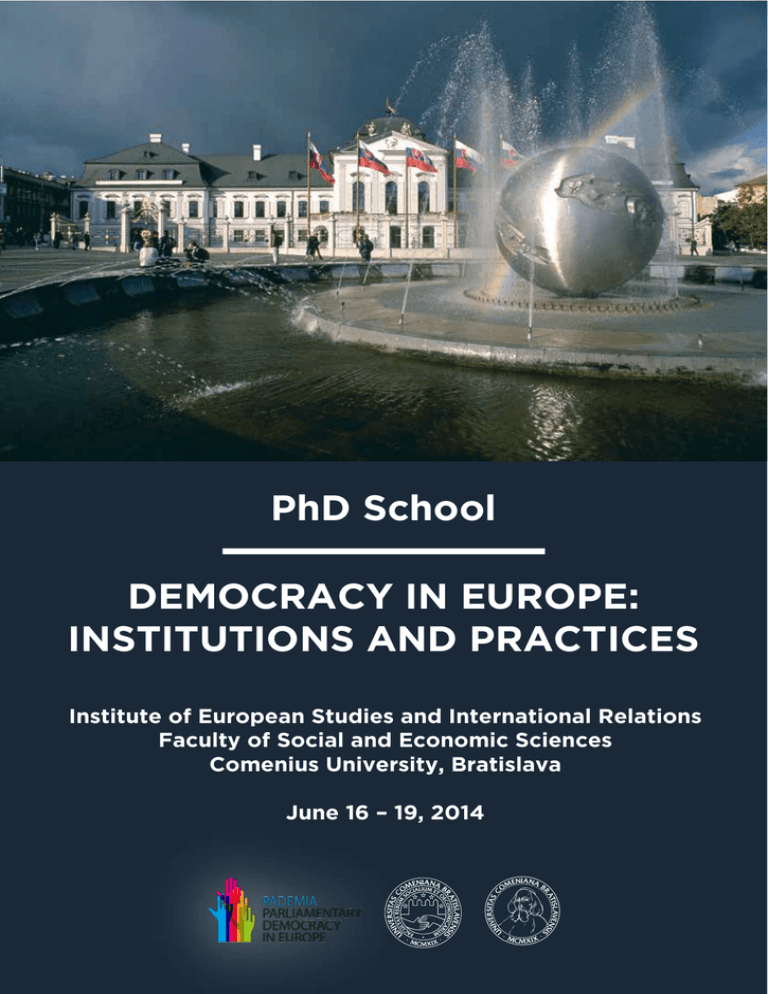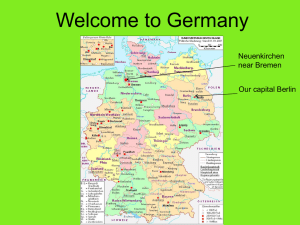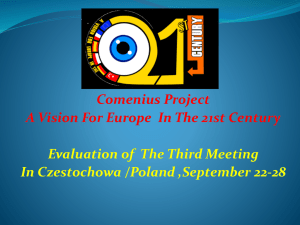PhD School DEMOCRACY IN EUROPE: INSTITUTIONS AND PRACTICES
advertisement

PhD School DEMOCRACY IN EUROPE: INSTITUTIONS AND PRACTICES Institute of European Studies and International Relations Faculty of Social and Economic Sciences Comenius University, Bratislava June 16 – 19, 2014 Aims and scope Governance in the EU is going through profound changes. The EU anno 2014 is larger and less coherent than a decade earlier. Growth of institutional arrangements post-Lisbon combined policies and politics among the member states. Euroskepticism and various forms of nationalism are on the rise and threaten some of the most fundamental achievements of European integration. What are the conditions for the development of democratic governance in the EU under such circumstances? The PhD school Democracy in Europe: Institutions and Practices organized as part of the PADEMIA project features lectures and seminars with leading experts on democratic governance in the EU. The focus is on the emerging institutional architecture of the Union, changing modes of representation, shifting roles of parliamentary democracy, new issues in party politics and on changing perceptions and images of the Union. The school will provide an opportunity to PhD-scholars to present and get feedback on their own research projects related to this themes. In addition to getting insights into the state of the art in the theoretical debates, participants will get an opportunity to learn about various Central European aspects of the evolving political order in the EU. Lecturers Jozef Bátora IESIR Comenius University Christophe Crombez FSI Stanford University Oľga Gyarfášová IESIR Comenius University Karen Henderson IESIR Comenius University Giandomenico Majone EUI Florence Silvia Miháliková IESIR Comenius University Johannes Pollak Deptartment of Political Science IHS Vienna Jarle Trondal ARENA University of Oslo Program overview Monday, June 16, 2014 Tuesday, June 17, 2014 Morning public lectures: Morning public lectures: A Political-Economic Analysis of European Union Politics: The Budgetary Process Christophe Crombez, Stanford University democratic default? The normative dimension of the euro crisis (keynote lecture) Giandomenico Majone, EUI Florence Contrasting visions of the EU: EP election manifestos and Euroscepticism Karen Henderson, IESIR, Comenius University EU images in transition Silvia Miháliková, IESIR, Comenius University Afternoon lecture and workshop : Afternoon workshops with Christophe Crombez The limits of collective action and of collective leadership Giandomenico Majone, EUI Florence + Wednesday, June 18, 2014 Thursday, June 19, 2014 Morning public lectures: Morning public lectures: Compounded, confounded or just confused? Political Representation in the EU Johannes Pollak, Institute of Advanced Studies, Vienna From multilevel governance to multilevel administration. Studying the European Administrative System Jarle Trondal, ARENA, University of Oslo and University of Agder Convergence or Divergence: Parties and their Voters in the 2014 EP Elections with a focus on Visegrad Countries Oľga Gyarfášová, IESIR, Comenius University Interstitial organizations and institutional innovation in EU governance Jozef Bátora, IESIR, Comenius University Afternoon workshops with Johannes Pollak Afternoon workshops with Jarle Trondal Applications Applicants should be PhD-students from institutions participating in the PADEMIA network (www.pademia.eu). To apply, send a short abstract of no more than 300 words explaining the topic of your PhD research and reasons why you should be invited to participate to pademia@fses.uniba.sk. Application deadline: April 15, 2014. Successful candidates will be ECTS credits To earn 10 ECTS credits, participants will be expected to complete a paper by August 10, 2014. Fees, travel and accomodation There is no fee for participation. The school will cover travel expenses (up to 350,- euro) and hotel accomodation for up to 5 nights for 16 selected participants. The easiest way to reach Bratislava (the bus ride takes 55 minutes). Host institution Comenius University is the oldest and largest university in Slovakia. Founded in 2002, the Institute of European Studies and International Relations (IESIR) at the Faculty of Social and Economic Sciences at Comenius University is the leading political science department in Slovakia. IESIR has an active research agenda focusing on the changing nature of European and global politics with publications by its faculty members in leading international peer selected student body counting over 300 undergraduate and graduate students and most courses taught in English by Slovak and international lecturers, IESIR offers bachelor, masters and doctoral degrees in European studies and politics. For more information visit www.fses.uniba.sk/index.php?id=english-uesmv



